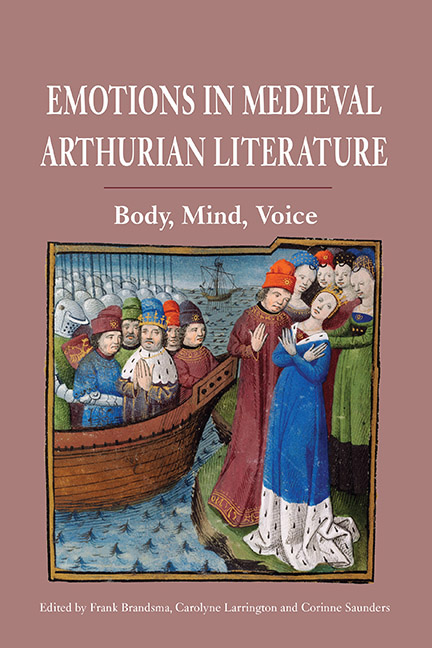8 - Emotion and Voice: ‘Ay’ in Middle Dutch Arthurian Romances
Published online by Cambridge University Press: 21 May 2021
Summary
T. H. White's The Once and Future King is one of the most popular and enduring retellings of the Arthurian legend, in the Netherlands as well as in the Anglophone world. In his March 2011 column, on speed skating, Utrecht's city poet Ingmar Heytze refers to the Dutch translation of White's work as the most beautiful book he knows. He uses the description of Lancelot's superior way of jousting to present his admiration for the ease and commitment with which a famous Dutch skater tackles the 10,000 metres. According to White's narrator, spectators and opponents would always recognize Lancelot's style:
The riding was the whole thing. If a man had the courage to throw himself into the fullest gallop at the moment of impact, he generally won. Most men faltered a little, so that they were not at their best momentum. This was why Lancelot constantly gained his tilts. He had what Uncle Dap called élan. Sometimes, when he was in disguise, he would ride clumsily on purpose, showing daylight at his seat. But at the last moment there always was the true dash – so that onlookers, and frequently his wretched opponent, could exclaim, ‘Ah, Lancelot!’ even before the lance drove home.
The Dutch translation gives the exclamation as: ‘Ai, Lancelot!’ Ah and Ai, the shared words of the onlookers and opponent, express a mixture of fear and admiration and perhaps even curiosity – where does he come from? – as well as sadness about the inescapable fall. Words do not come much smaller than Ay, yet the mini-word may give voice to a whole range of emotions, and the same goes for its medieval equivalents.
Words like ha and hélas in Old French, and, in Middle Dutch, words like ay, owi, and acharmen, are quite common in Arthurian romance. By means of these exclamations, characters, and sometimes also the narrator, give voice to sorrow, joy, fear, or curiosity. Their emotion is presented as strong and spontaneous, as in the following example from the translation of the Suite-Vulgate du Merlin by Lodewijk van Velthem, made in 1326.
- Type
- Chapter
- Information
- Emotions in Medieval Arthurian LiteratureBody, Mind, Voice, pp. 143 - 160Publisher: Boydell & BrewerPrint publication year: 2015

